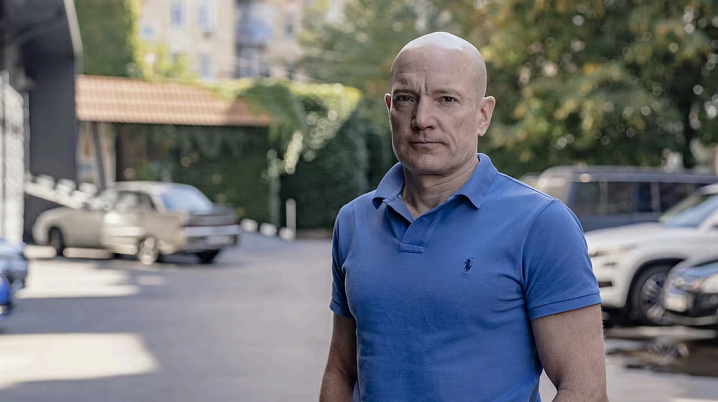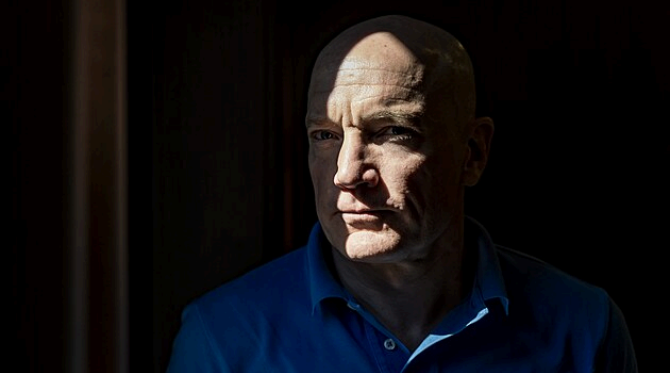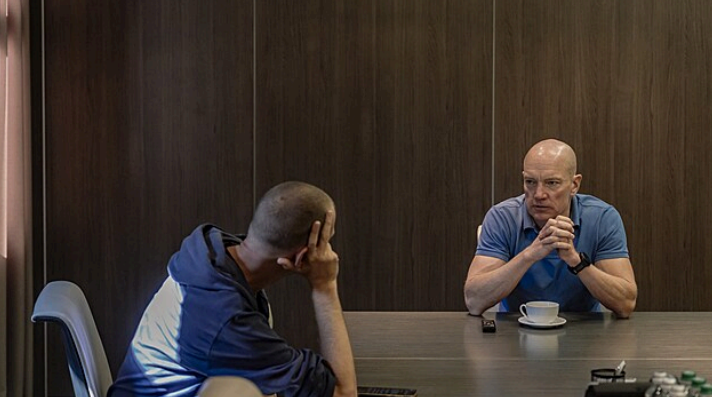“Presidents Don’t Like Me Here,” Says Czech Businessman in Kyiv. He Donates Millions to Support the Army

Russian drone and missile attacks are becoming increasingly intense. Last Sunday, over eight hundred drones flew toward Ukraine, and in Kyiv a missile even struck a government building. What is the atmosphere in the capital?
People have gotten used to it. It was worse at the beginning, when more missiles were flying. The worst was between 2022 and 2023, when there were blackouts, and some of our employees had no electricity at home for five days, for example. That also meant no sewage — and that’s a serious problem. In one of our business centers, we converted a floor into living space for employees. Today there are fewer missiles, but far more drones, and they attack almost continuously. They wake me up every other night, and every two weeks the attacks in Kyiv take many lives.
You can get used to anything, but of course I don’t want to downplay it. This situation affects people’s psyche. Doctors say that life expectancy has fallen significantly in the last three years. And it’s not just because people are dying at the front or being killed by missiles and drones. Stress also plays a big role. The number of heart attacks has risen sharply, and the mental strain has a huge impact on health.
In the Czech Republic, you are mostly mentioned in connection with your ownership of Ukrainian media. How did you get into that?
I’ve owned the NV.ua portal for eleven years, and Ukrainska Pravda for just over four. For me, it’s not a business — it’s a social responsibility. We started investing in media right after the 2014 revolution. Before then, Ukraine stood on the edge between Belarus and the EU and could have turned into an authoritarian country. Most media were controlled by four or five oligarchs, who converted them into political dividends. Or by Russians — Russian influence in the media was very strong.
I wouldn’t have started this from scratch, but I knew a team of journalists who had left Korrespondent about six months earlier due to censorship. I trusted them completely, knew they were 100% independent professionals, so I founded NV with them. My condition was that they become profitable within three years, so I wouldn’t have to subsidize them, as is common here. It took a bit longer, about five years, but today it takes only 1% of my time.

And how was it with Ukrainska Pravda?
Olena Prytula offered us to buy it. She had founded it in 2000 together with Georgiy Gongadze, who was murdered six months later. She ran it alone for twenty-one years, and in 2016 here in Kyiv, her next partner and co-manager, Pavel Sheremet, was also murdered. So it’s quite a difficult history.
Olena had seen our experience with NV.ua and knew we had no influence on the newsroom. She could have sold the paper to a local buyer for more, but we agreed on a fair valuation, and she essentially handed it over to us so that we would continue to take care of it.
Traditional media are not considered too promising as a business today. How are yours doing?
When we bought Ukrainska Pravda, there were fewer than seventy employees. Today there are 180. We didn’t have to invest beyond the purchase price; we just applied our know-how in technology and commercialization. We helped them grow their audience and advertising revenue significantly, so they could start paying journalists proper market salaries. That hadn’t been the case before — they worked there because Ukrainska Pravda was the strongest and most independent brand. They also acquired other portals, like sports site Champion or European Pravda. Today Ukrainska Pravda has about 15 million unique readers, NV over 10 million, and their YouTube channels over one million subscribers.
Didn’t entering media just bring you trouble? Ukrainska Pravda is often under fire from politicians. Last fall, editor-in-chief Sevgil Musayeva complained of pressure from the presidential administration.
Of course, by investing in Ukrainska Pravda I brought myself problems, but I don’t regret it one bit and I’m happy to continue. I don’t plan to sell either Ukrainska Pravda or NV. It’s my contribution to Ukrainian democracy. Most Ukrainian businessmen don’t realize it, but if Ukraine were a more democratic country with a developed economy, like Poland or the Czech Republic, business here would be much safer and their investments more valuable. Ukraine would also be stronger and better able to defend itself from Russia.
So it’s not just a social project — it also makes commercial sense. Politicians, of course, don’t like it. None of the last three presidents has liked me. But that’s just the way it is. Freedom of speech matters more to me than currying favor with someone.

Where does the pressure come from today — the Presidential Office and its business allies?
Usually it comes from politicians who don’t like journalists writing about corruption. Local politicians have never liked freedom of speech, so they don’t like independent journalists. Sometimes it touches the media owner as well. During wartime, 80% of the media are controlled by the government. That includes not just TV, but also anonymous Telegram channels. Things have never been so critical that we wanted to abandon our media. We certainly won’t back down just because someone smears us or sabotages something.
By “smear campaigns” you mean, for example, reports that you still own property in Crimea?
Yes, usually that’s what it’s about. When we publish something about government corruption, an anonymous Telegram channel posts threats against me or my company. The problem is that so-called “Russian ties” are used for discrediting. That tradition goes back to 2014. Even under Poroshenko, the SBU came to us looking for Russian software, but they found nothing. Yet the same method is still used.
Recently, even the G7 ambassadors spoke up in your defense. This may sound cynical, but isn’t owning Ukrainska Pravda also a kind of insurance for your business? Since Western states will always intervene if freedom of speech is threatened…
Many people defended us, not just the G7 ambassadors. But of course, they carry weight — Ukraine depends on external aid. We also spoke with the Czech ambassador in Kyiv, the foreign minister, with Mr. Kopečný (the Czech government’s envoy for Ukraine’s reconstruction — ed.), and with President Pavel. Ukraine wants to join the EU, and to get there, European and also American diplomats need to explain to some hotheads what the EU actually means and how media function in it.
Speaking of corruption: in July Ukraine saw its largest protests since February 2022, triggered by the President’s Office trying to limit the powers of anti-corruption agencies. Were you surprised by the demonstrations?
If there were no war, I wouldn’t have been surprised — Ukrainians would definitely take to the streets. But during wartime, people don’t want to destabilize the situation, since the main danger comes from Russia. The primary goal is defense, and “fixing” democracy can wait until the war ends.
What surprised me most was how massive the protests were. By the second day, they weren’t just in Kyiv and Lviv, but also in Odesa and Dnipro. I was also surprised by how many young people were there. Older men, of course, are afraid that if they take part, they might be mobilized.
But I think it’s good people voiced their opinion. When parliament passed the law on July 22 and the president signed it, I was very upset. But fortunately, the president and his close advisers backtracked — partly because of Ukrainians’ reaction, and partly because of international partners’ reaction, on whom Ukraine depends.
Do you think the presidential administration will try again to curb the powers of NABU and the Specialized Anti-Corruption Prosecutor’s Office?
The anti-corruption bodies believe they will try again, but not on such a large scale — only partially. For Zelensky’s administration, this was a big lesson, and right now the independence of these agencies is not under serious threat.
There is much talk about Ukraine’s postwar reconstruction. What would you advise Czech investors before they enter the local business environment?
If you want to succeed here, you need a very hands-on approach. Over the past twenty years, several Czech investors have been here. For example, PPF made some investments, but they weren’t very lucky and sold almost everything. They were in banking, but after the 2008 crisis that wasn’t very attractive. Now it is attractive — in 2021 Ivan Svitek and I bought a bank here. In energy, Karel Komárek operates here, and I think successfully.
The local market is definitely interesting and growing. There are more security and macroeconomic risks, and the rule of law is weaker. But on the other hand, there is far less competition, so if you capture market share, you can offset that with higher earnings and profits.
When people hear “Ukrainian business,” the word “oligarch” comes to mind. What role do people like Rinat Akhmetov, Ihor Kolomoisky, or Viktor Pinchuk play today?
Their influence has weakened significantly. It was strongest in the late 1990s, but then gradually declined as many other Ukrainian businesses emerged — in agriculture, IT, services, retail, or manufacturing. The oligarchs had privatized heavy industry, but their share of the economy shrank because their sectors, like energy and metallurgy, didn’t grow as fast.
Their media influence is also waning. After the war began, the government took control of TV and news, everything is coordinated from the Presidential Office. Rinat Akhmetov still spends 99% of his time in Ukraine. Ihor Kolomoisky has been in custody for two years. Viktor Pinchuk still comes, holds conferences here, and brings many foreign journalists, politicians, and businessmen.
But the influence of the old-style oligarchs who controlled the four big TV groups has dropped significantly.
This spring, there was much talk about the “Trump mineral deal.” What Prime Minister Svyrydenko agreed for Ukraine — was it just a distraction to appease the U.S. president? Or do Ukrainians see it as a real commitment?
The first American proposal looked very disadvantageous for Ukraine. But what was finally agreed and signed looks like a fair deal for both countries. For Ukraine, it’s definitely attractive if Americans invest here through the DFC (U.S. International Development Finance Corporation) and help American investors.
Today we see that the world depends on China, which controls 70% of extraction and 90% of processing of critical materials. America and Europe must have alternative sources. The European Commission signed a memorandum with Ukraine five years ago, but it hasn’t really worked.
Americans are more persistent and faster, and for Ukraine this final deal is definitely positive.
Would this line of investment interest you?
For us, critical minerals are not interesting. The Chinese will always dump prices, so it will always be cheaper to buy from them. The Pentagon just bought critical materials from a U.S. company at twice the market price. But that’s not how markets normally work.
What about arms production? Doesn’t that interest you?
As for military production, every year we give at least 100 million hryvnias to various Ukrainian brigades. We buy them weapons and other things. In 2023 we considered direct investments in production, analyzed most local manufacturers, but in the end decided not to invest. This sector is very promising and there is plenty of money. Production capacity exists — the government estimates it at $30 billion per year, but funding is for less than half. Still, there are many manufacturers here, and you always depend on the state as your only client. Exports aren’t possible yet. That seemed too risky to us, since we historically invest in sectors with minimal state dependence.
Among the brigades you support financially are “Khartia” and the 3rd Assault Brigade. These units are also the most visible in fundraising and recruitment — their billboards are all over Ukraine. What makes them better than others?
They are the most successful because they have the best management. “Khartia” was founded by Kharkiv businessman Vsevolod Kozhemiako, who previously ran the successful agricultural company Agrotade. In 2022 they started with 100 people, then expanded to a battalion, then to a brigade. When I last visited them in Kharkiv, they had about 3,500–4,000 people. Now they are a corps — five brigades, that’s 25,000 people. That’s already a huge unit. Salaries, vehicles, fuel — you need to understand business, economics, finance, logistics to run something like that.
One cannot help but wonder what role these corps and brigades will play after the war. Since they already function, in essence, independently of the state…
The military will definitely play a major role in society and politics. This was already clear in the 2014 parliamentary elections, when all parties included military figures on their lists. Some might even create their own parties or run for president, like Valeriy Zaluzhny — at least, he still appears in opinion polls.
So everyone expects him to run for president one day?
He’s never spoken about it, and I don’t think he’ll say anything until there’s peace. Everyone is very cautious. I don’t know him personally, so it’s hard to say if he’s decided anything. The war may last a very long time. But clearly some military figure will be there. If you look at opinion polls, the army is the most respected institution in society. There is demand for military figures. But people don’t want a party made up only of soldiers focused solely on defense. There needs to be someone who knows what to do with the economy, and so on. So it won’t be a parliament that’s 100% military.
